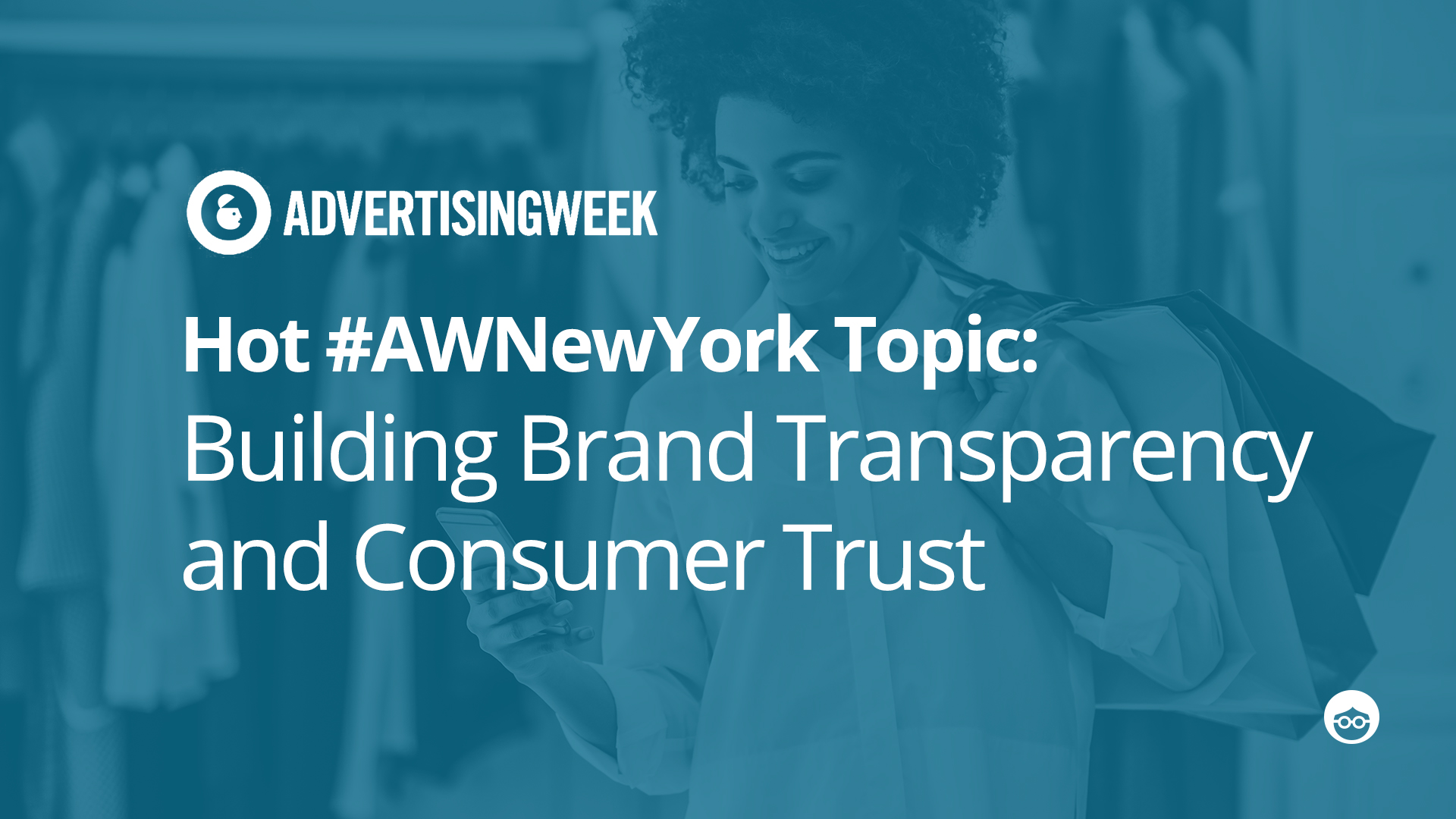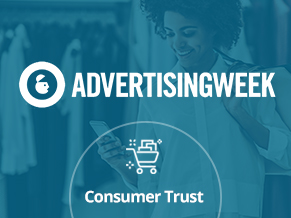5 Takes on Trust: Advertising Week NY 2019

Have you ever found yourself talking about, or merely thinking about, a product only to see that exact item advertised on your Instagram feed an hour later?
Now, more than ever, our devices are an extension of ourselves, and with that sense of attachment comes an eerie feeling of surveillance.
The rapid advancement of ad targeting capabilities has turned content personalization into an expectation rather than an option. However, this demand for relevant digital experiences is simultaneously raising concerns of trust and transparency, coming from consumers, brands, and platforms alike.
This week at Advertising Week NY, conversations of trust and transparency flowed throughout, tackling the issue from the point-of-view of a consumer, a marketer, a publisher, an influencer, and every player in-between.
That’s five different perspectives on the issue of trust in our industry today, and how we can collaborate to create a transparent, consumer-confident future.
Here’s a glimpse into each perspective:
- Users are annoyed by advertising, but they don’t understand it’s financing the content
- Ad taxes are very real, [and] some of them are worth paying
- One thing you can’t fake is conversion
- Lack of transparency shows up when a buyer says ‘Oh, I thought I was getting this
- We battle the narrative that news is an unsafe place for marketers
#1 “Users are annoyed by advertising, but they don’t understand it’s financing the content.”
Thomas Pasquet, Co-Founder and CEO of Ogury, hopes to see the industry become more transparent in regards to what data is being collected from users, and how it’s being used.
“We’ve been talking to the user like a kid for the last 20 years, pretending that everything is free,” he explained. “Suddenly, users are annoyed by advertising, but they don’t understand that it’s advertising that is financing the content.”
In an ideal world, Pasquet describes three options users would have when consuming digital content: pay for access to the content with money, pay with data so that publishers can monetize the content better via relevant advertising, or accept a bad user experience.
#2 “Ad taxes are very real, [and] some of them are worth paying.”
According to a 2019 Norton Lifelock survey, 83% of Internet users worldwide said they are concerned about their digital privacy. Nevertheless, 61% would be willing to accept certain risks pertaining to their digital privacy for the sake of convenience.
The key difference between these two survey questions is data transparency, or lack thereof. If, as an industry, we were able to inform users of what information is being collected, fear would reduce immensely; the unknown seems to be the fear factor.
“Ad taxes are very real, [and] some of them are worth paying,” said Luke Lambert, Head of Programmatic at OMD USA. “When they’re put to work for the right reasons, then absolutely we should pay that fee, but when you’re not aware of them, then there’s a different conversation to be had. I welcome anyone and everyone who is trying to create some more transparency in the supply path.”
#3 “One thing you can’t fake is conversion.”
Digital Strategist Devan Anderson partners with brands directly. And as a social media influencer with a strong presence on Youtube and Instagram, Anderson discussed the trust issue from the perspective of a brand looking to partner with an influencer.
Fake Instagram followers are incredibly accessible, making it possible to build a “following” of hundreds of thousands of users in a matter of minutes. However, Anderson combats this issue by encouraging genuine content creators to stay true to themselves, their followers and the brands they work with.
“One thing you can’t fake is conversion,” he said. “Let’s move the needle and see if we can help the bottom line of the people we work with. That’s one thing you just can’t fake.”
#4 “Lack of transparency shows up when a buyer says ‘Oh, I thought I was getting this.”
As sophisticated targeting plays an increasingly integral role in a successful digital strategy, marketers are collecting and leveraging more data throughout their campaigns as a result. However, the process in which this data is being gathered, cookie-matched, and presented is pretty opaque.
Kyle Dozeman, VP of Advertiser Solutions at PubMatic comments, “Lack of transparency shows up when a buyer says ‘Oh, I thought I was getting this.’”
Often times, predictive algorithms are being used when 100% certainty is guaranteed, for example. Dozeman emphasizes the importance of marketers understanding how data providers and platforms are collecting, tracking and utilizing their data, until eventually, this becomes the industry standard.
#5 “We battle the narrative that news is an unsafe place for marketers.”
Publishers are facing a unique set of challenges as the push for trust and transparency builds. A recent Northeastern University study said that 36% of students are concerned over the threat of fake news to the extent that they’ve lost trust in the news entirely. “We battle the narrative that news is an unsafe place for marketers,” said Christine Cook, CRO of CNN Digital at WarnerMedia.
For marketers, the previous notion of “brand safety” is being challenged and redefined, as many fear association with controversial content, such as politics and crime, will negatively impact their reputation. Keyword blocks are becoming increasingly common, though this isn’t a perfect solution to the larger brand-safety issue.
“As our world is shifting, it’s trust in sources of content and media, but it’s also trust in your partners as both sides are starting to innovate,” Cook explained. “If you trust your partner there is a little bit of vulnerability that happens in that, but we’re not going to super-serve our shared customers if we don’t lean into that kind of experimentation and trust.”
Trust and transparency are crucial, no matter the perspective. And as discussions of GDPR remain, and those of CCPA and other acts arise, this is becoming more and more evident for everyone from the marketer to the end consumer, seen throughout this year’s Advertising Week NY and beyond.
For us, it’s been a staple from the onsite of our founding. Outbrain is truly committed to ensuring we clearly explain how we collect and protect the personal data of our marketers, media companies, and audiences.
Feel free to read more on our perspective in our Trust Center.











